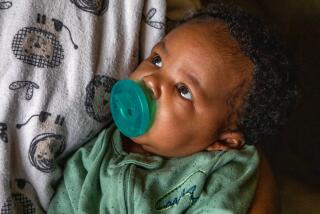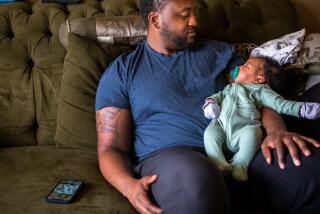Op-Ed: It’s OK to sleep next to your infant child. It’s even beneficial.
Parents everywhere tend to think that the way they raise their children is the best way, and Americans are no exception. Contemporary American parents seek to optimize their children’s lives, treat them as equals, and reduce their risk of harm to zero; anything less may seem negligent. Yet many of the practices Americans hold as sacred are quite rare in other countries — and the burdens Americans place on themselves are often unwarranted.
One of the major challenges in the first year of parenting, any new mom or dad can tell you, is training a child to sleep. American middle-class parents routinely put their infants to sleep in a separate bed or a separate room, on the assumption that there might be serious risks to having the baby next to them. This is largely due to expert advice: The American Academy of Pediatrics advises against parent-child co-sleeping, or “bed-sharing,” citing safety concerns from accidental suffocation or falls. Doctors worry that tired — or intoxicated — parents will roll onto their infants in the middle of the night without realizing it. Putting babies in cribs or cots in a separate room is also customary in Britain, Germany and other parts of Western Europe.
In most of the rest of the world...parents think it’s downright cruel to put a baby in a separate room or even a separate bed. Who would be so heartless?
In most of the rest of the world, however, parent-child co-sleeping is well-established, as we have found in our studies in Africa (Nigeria, Kenya and Zambia), Asia (Nepal, India) and Latin America (Mexico, Colombia) and as other anthropologists have reported from other sites in those areas. Indeed, many parents think it’s downright cruel to have a baby sleep alone. Who would do such a heartless thing?
Of course non-Western countries tend to have higher infant mortality rates, but there’s no reason to think that has anything to do with co-sleeping. In Japan — a large, rich, modern country — parents universally sleep with their infants, yet their infant mortality rate is one of the lowest in the world — 2.8 deaths per 1,000 live births versus 6.2 in the United States — and their rate of sudden infant death syndrome, or SIDS, is roughly half the U.S. rate.
There’s reason to believe that co-sleeping isn’t just safe, but also beneficial. The biological anthropologist James McKenna, who has investigated mother-child co-sleeping at his Mother-Baby Sleep Laboratory at the University of Notre Dame, has provided detailed evidence of the physiological synchronization between mother and infant when they sleep together, especially when the mother also breastfeeds responsively. He considers this arrangement optimal and calls it “breastsleeping.”
When we asked mothers of the Gusii tribe in Kenya, where co-sleeping is common, whether their babies slept through the night, they didn’t know what we were talking about — why should babies wake up? When we compare Gusii and American mothers, it is the Americans who seem to make infant care more complicated and difficult by putting their infant to sleep in a separate room, setting the stage for sleep disruption due to infant crying.
American parents may also worry that sharing a bed increases a child’s dependence on his parents, yet Japanese children appear to be just as mature and independent as American children.
Christine Gross-Loh writes in her 2013 book, “Parenting Without Borders”: “After years of living [in Japan] on and off, my husband and I (and even our kids) have noticed that most children — the same children who sleep with their parents every night — take care of themselves and their belongings, work out peer conflicts, and show mature social behavior and self-regulation at a young age. Japanese parents expect their kids to be independent by taking care of themselves and being socially responsible. They expect them to help contribute to the household or school community by being capable and self-reliant.”
All things considered, we have to agree with McKenna’s conclusion: the proven benefits of mother-infant co-sleeping far outweigh the largely imaginary risks. Putting a baby in a separate room at night encumbers parents and leads to their exhaustion without guaranteeing the safety or future character development of their children.
American parents also add to their burdens in other ways that are rare elsewhere in the world: for example, by offering their toddlers choices (about what to eat, what to wear, even where to cross the street), by making chores and responsibilities optional, and by fostering the child’s early speech development without rules to restrain interrupting adult conversation.
The anthropologist Margaret Mead once proposed that human diversity in child rearing was like a grand experiment enabling American parents to “read the answers” to their questions — without having to try them out at home. We no longer believe that reading the answers is as simple as Mead implied in 1930, but if Americans looked to parents in other cultures, they would perhaps realize that the “best” way to raise a child is not necessarily the most difficult, and ease up a bit.
Robert LeVine is professor of education and human development, emeritus, at Harvard University. Sarah LeVine is a former research fellow in human development at Harvard University. They are the authors of “Do Parents Matter? Why Japanese Babies Sleep Soundly, Mexican Siblings Don’t Fight, and American Families Should Just Relax.”
Follow the Opinion section on Twitter @latimesopinion or Facebook.
MORE OPINION
Why does Edward Snowden get more high-profile support than Chelsea Manning?
Could a Clinton presidency unleash a post-gender society? Not a chance
More to Read
A cure for the common opinion
Get thought-provoking perspectives with our weekly newsletter.
You may occasionally receive promotional content from the Los Angeles Times.










